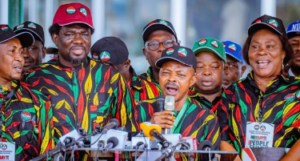As the Organised Labour initiates a nationwide strike to demand a new minimum wage for workers, the Minister of Finance and Coordinating Minister of the Economy, Wale Edun, emphasized the importance of proactive wage negotiations.
In a recent press interview, Edun stressed that stakeholders, including the Federal Government, labour unions, and the Organised Private Sector, should not wait until the expiration of the five-year validity period of the minimum wage before initiating discussions on a new living wage.
Edun, addressing journalists points out the complexity and significance of the wage negotiation process in a democratic setting. “The negotiation process is complex and difficult, but with goodwill on all sides, we will come to a landing that benefits all Nigerians,” he stated, acknowledging the challenges faced in reaching an agreement that satisfies all parties involved.
The Minister highlighted the legal framework governing the minimum wage, noting that it mandates a review every five years. However, he suggested that waiting five years each time to set a new wage scale may not be practical given the dynamic economic conditions.
“It is difficult because the worker deserves his wage and given what is going on, they deserve a change and, in fact, by law, every five years. Maybe, we shouldn’t have to wait five years every time to set a new wage scale. The fact is that by law, it is a minimum wage,” Edun explained.
He further elaborated on the implications of setting a minimum wage in a federal system, where the mandate extends beyond federal employees to include state and local government workers, as well as those in the private sector and small businesses.
“You are not setting a wage for Federal Government workers, for example. In a Federation, you are setting a minimum figure that states must pay, that local governments must pay, that the private sector must pay, that small businesses must pay. It is a fixed figure, not a scale,” Edun clarified, highlighting the broader impact of minimum wage legislation.
Edun pointed out that past practices of consequential adjustments to the minimum wage could become unsustainable under current demands. “There are elements of how we have set the minimum wage in the past, particularly what we called the consequential adjustment, which, given what Labour is asking today, will be unaffordable across the board,” he remarked. He emphasized the need for affordability considerations, ensuring that any legally mandated wage is feasible for all entities required to comply.

Moreover, Edun suggested exploring alternative means to support workers’ cost of living beyond wage increases. “We probably have to also take into account the fact that there are other ways of supporting the cost of living of workers other than the wage scale,” he noted, indicating the potential for comprehensive benefits packages and other support mechanisms.
The current impasse stems from the Nigeria Labour Congress (NLC) and the Trade Union Congress (TUC) asserting that the existing minimum wage of ₦30,000 is insufficient to sustain the average Nigerian worker.
The unions lamented that many state governors have failed to pay the current wage, which expired in April 2024. The Minimum Wage Act of 2019, signed by former President Muhammadu Buhari, stipulates a review every five years to align with contemporary economic demands.
Faced with the government’s inability to reach a consensus on a new minimum wage, the labour unions set a deadline of May 31 for the Federal Government to propose a viable figure. When the deadline passed without resolution, the unions declared a nationwide strike commencing on June 3, 2024.
The failed negotiations saw the labour unions rejecting three government offers, the latest being ₦60,000, with the TUC and NLC firmly insisting on a new minimum wage of ₦497,000.
This substantial demand reflects the unions’ stance on what they believe is necessary to ensure a decent standard of living for Nigerian workers amidst rising inflation and the escalating cost of living. The unions argue that the government’s proposals have been insufficient and that a significant increase is required to address the real economic challenges faced by workers.
The nationwide strike is expected to have far-reaching impacts, disrupting various sectors and putting additional strain on an already fragile economy. The Organised Labour’s determination to proceed with the strike underscores the urgency of their demands and the broader socio-economic struggles within Nigeria.
As the strike unfolds, the government and citizens alike brace for the inevitable disruptions, hoping for a resolution that balances the needs of the workers with the economic realities of the country.




